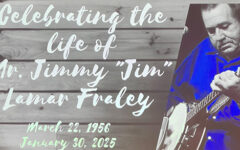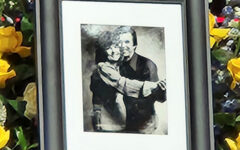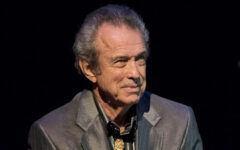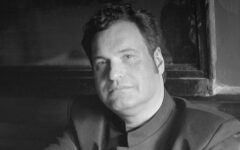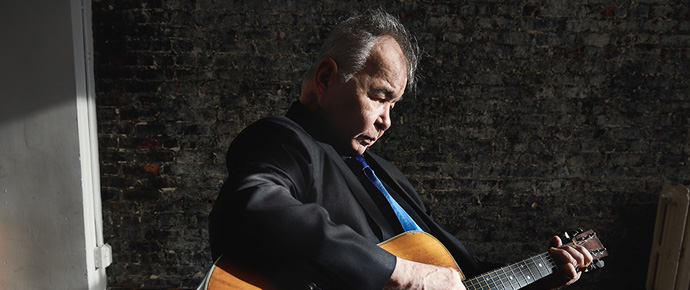
John Prine didn’t play bluegrass, but he loved bluegrass music and influenced a generation of bluegrass songwriters and artists, and he indirectly guided one well known artist through a scary medical condition that left her career at risk.
So the feeling of sorrow at the news of his untimely passing Tuesday night rocked the bluegrass world as though he was one of our own.
Some, like John Cowan and Jesse McReynolds, were fortunate enough to know him and share the stage and studio with him. Others had the opportunity to see him over the years, but were too starstruck to say anything. And others knew him only through his songwriting.
But all of them told me a version of the same story today in reacting to his death from the corona virus: John Prine was an American original and music needs more like him.
There’s a common theme that runs through this story, and it’s Prine’s song, Paradise. It takes its name from the Kentucky town where Prine’s mother was from.
“When we heard Paradise, it was like DING! For us it was where we lived,” said John Cowan, who played in the New Grass Revival and still tours with the Doobie Brothers, and does occasional bluegrass gigs with Darin and Brooke Aldridge.
“He just got it, got what we were trying to do. He treated us with great respect and kindness,” Cowan said. The band went on to open 25 to 30 shows for Prine back in the day. “It was pretty heady stuff for us. He really loved bluegrass music. It was something he got.”
For Jesse McReynolds, the song was the gateway to a long friendship with Prine. The Seldom Scene was the first bluegrass act to cut Paradise, but Jesse and his brother Jim weren’t far behind.
The version Jesse handed over to the studio was by John Denver. When a label executive asked about the song, Jesse said simply, “It’s written by one of the greatest songwriters in the business.”
After Jim died, Jesse got to record the song again, this time with a high level assist. He was working in Prine’s studio, which he wound up doing regularly over the years. One day, Prine walked in and said he wanted to sing on the record.
“I only knew one of his songs at that time, so we did Paradise, just my mandolin, John’s fingerpicking on guitar and our voices,” Jesse recalled.
Soon after, Jesse invited Prine to appear with him on the Grand Ole Opry for the first of many occasions. Paradise was one of their go-to songs.
“He was a nice guy,” Jesse said. “He was very socialable to everybody. Everywhere I’d go, I’d keep running into John Prine.” Somewhere, it’s not hard to imagine, Prine is telling anyone within earshot the same thing about Jesse McReynolds.
The Jim and Jesse version had legs. In New England, Stephen Mougin remembered hearing that version, and then hearing his dad learn it shortly thereafter.
“Even as a kid, I was amazed at the line, “where the air smelled like snakes, and we’d shoot with our pistols, but empty pop bottles was all that we’d kill.”
Hundreds of miles to the west, in Minnesota, Becky Buller’s parents heard the Jim and Jesse version and brought it to their band. It was the first Prine song the future bluegrass star heard, and it remains one of her favorites. And she cited the same lines.
“As a songwriter, I’ve definitely been influenced by him,” she said. “I love his stark storytelling.”
By the time Dudley Connell joined the Seldom Scene in the mid-1990s, Paradise had long been a staple in the band’s set list. Connell sang it the way it had been arranged years earlier, most likely by co-founder John Starling. It had one unusual attribute: it was done in six-eight time instead of Prine’s three-four time. The words fly by faster than the current on Kentucky’s Green River after a heavy storm. But it works.
“He was one of my idols from when I was in my early teens,” Connell said. “John Prine was a rock star. He was always bigger than God to me.”
What Connell loved was that Prine could be “so quirky and clever,” and yet his songs usually ended up being “simple stories told simply.”
For those wondering what Prine would have sounded like playing bluegrass, or at least playing a bluegrass song, it might not be too late. Prine recorded a Hazel Dickens classic, Mama’s Hands, for a tribute to the West Virginia songbird. Connell, who sang harmony with Dickens for years, was asked to add harmony to Prine’s lead.
The project has been on hold for a number of years, but is still expected to be released. Connell said he’s proud of the part he sang to Prine’s pre-recorded lead, but when he listened back, he told the producer he thought the song was better with Prine as the lone voice.
“Whether my part makes the record or not, I don’t care. I got to sing with John Prine, and that’s all that matters,” Connell said.
Prine wasn’t in the studio the day Connell laid down his tracks. They’ve never met, although they were together backstage a few years ago at Hardly Strictly Bluegrass in California.
“I didn’t have a chance to talk to him,” he told me. “Actually, the truth is, I was too shy to approach him.”
I heard the same thing from other writers and artists, people who are good with words, but couldn’t find them when the time came to say something to Prine.
And even those who are great with words say they long to reach Prine’s level of greatness.
“The way he writes is the way I wish I could write,” said award-winning writer Donna Ulisse. “He just said it the way he wanted to say it.”
Irene Kelley, who is also on the Paradise bandwagon, called his writing “powerful and amazing. He’s had a lot of influence on me going way back.”
Songwriter and recording artist Valerie Smith felt a deeper connection to Prine at his death than just the author of some of the best songs ever written. A few years back, she had an illness that threatened her career.
“When I went through my vocal problems and couldn’t sing like I used to, and like I wanted to, I was scared,” she told me. “Hearing about John Prine and his cancer treatment inspired me. He taught me there was still a place for me in this business. I learned from him how to mend myself as an artist.”
“I’m going to miss him being in the world.”
That goes for a lot of us.
I hope there’s room in the craft-heavy world of songwriting for the next John Prine to come along and write what he feels, in the way he feels it.
That said, I sure would have loved to be a fly on the wall – an angel on the wall, perhaps? – last night when Prine stepped through the Pearly Gates and came face to face with God asking him to explain one line. One line out of the thousands he wrote and sang.
It’s this one, from Sam Stone:
“There’s a hole in daddy’s arm where all the money goes,
Jesus Christ died for nothing, I suppose.”
I’m betting he had something to say.
Prine, as his friends called him, always had something to say.

